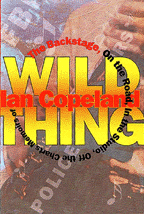
| Ian Copeland remembers his family's rise to rock prominence Wild Thing: The Backstage, on the Road, in the Studio, off the Charts Memoirs of Ian Copeland
Simon & Schuster Reviewed by Nicky Baxter They say a family that plays together sticks together, or something like that; well, the Copelands, Stewart, Miles and Ian all play the same game: rock & roll. And at times, they've played it together. Although only one, ex-Police drummer Stewart, really plays, his brothers have had an enormous impact on the industry as well. No doubt, the three of them have intriguing stories to tell, but Ian's the first to get a book deal.
Brother Stewart has a home page at http://www.dsi.unimi.it/mow/police/copeland/index.html
Wild Thing is a wry, telling story of how Ian Copeland struck it big as one of rock biz's key figures. As founder of Frontier Booking International (F.B.I.), he helped construct the highway to success for a fleet of new-wave acts. The roster reads like a Who's Who in 1970s alternative--and eventually mainstream--rock: Adrian Belew, the Buzzcocks, the Cure, Gang of Four, Iggy Pop, Morrissey, R.E.M., Nine Inch Nails and the Police. While the book serves up gobs of juicy tales of Ian's exploits, Wild Thing is more than your average autobiography--it's a kind of overview of how new rock managed to bumrush its way into an industry that 20 years ago was ossifying, a mammoth, self-satisfied old-boys club feeding off the carcasses of increasingly irrelevant acts like Foreigner. Boring old farts. When punk and its more stylized offspring arose to mount a rear-guard attack, the fat cats were caught with their pants down. The Copeland boys, among others, were only too glad to give 'em a good reaming. The Copelands were not like other kids. Though American citizens, they grew up in the strife-torn Middle East; Ian himself was born in Damascus. While the boys were out playing kick-the-can with the locals, Dad, a C.I.A. man, was playing a much more deadly game. Imperialist adventurism pays well, of course, and wherever the Copelands found themselves--Egypt, Beirut, London--they lived like kings, hobnobbing with the local elites. Copeland's account of this period, his childhood, is particularly fascinating, if oddly naive. With Pops constantly away on company business, home life evidently left something to be desired, and Ian turned out to be a problem child, hanging out with a youthful bunch of bikers, dodging Lebanese police. His escapades spelt potential trouble for the senior Copeland, and so Ian's father did what any concerned parent would do--he handed Ian his passport and sent him packing. Ian was, with parental permission, a run-away. Three years later, he joined the U.S. Army, enduring a grueling year as a grunt in Vietnam. It was his older brother Miles, who gave Ian his first break in show biz. His first gig? Road manager for a then up-and-coming hard rock act called Wishbone Ash. Ian would spend the next few years taxiing between Great Britain and America, learning the ropes from the ground up. It wasn't easy. Often dismissed in London as a yank yahoo by the insulated and incestuous music suits, his English accent got him few favors back in the U.S.A. More than anything, luck and sheer persistence were the keys to Ian's eventual success, though it certainly didn't hurt that brother Miles was beginning to gain a foothold with his fledgling IRS roster. Both men worked hard to secure for a niche for themselves in Mount Rock; any nepotism was nearly coincidental. Given the rock's stature a global venture, their cosmopolitan background and gung-ho attitude, contributed more than anything else to their respective success. And their youth. When punk first reared its tatty head in the mid-'70s, the Copelands were still in their 20s, a real boon considering early punk's deep distrust of old farts. It helped, too, that the rock establishment, from the booking agencies (Ian's domain) to management and record labels (Miles'), tried their level best to ignore the youthful uprising. Ultimately, Ian's and Miles' grand scheming worked because no one else cared. When little brother Stewart joined forces with two peroxide blondes to form the Police-with Ian's F.B.I. booking tours and Miles' IRS recording and managing--it was a fitting plum in the Copelands cap. Indeed, even the C.I.A. would appreciate the new breed's victorious insurgency. [ Metro | Metroactive Central ]
| |

